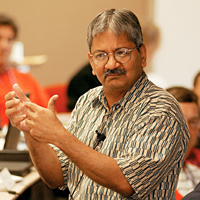|
Executives
and professors collaborate on knowledge creation that benefits
them both — and enriches learning throughout the school's
MBA programs
Teamwork
has been a Kellogg School hallmark for decades, so it's only
natural that students and professors in the Executive MBA
Program also collaborate on knowledge creation, each bringing
expertise to bear on today's most important leadership challenges.
This
two-way dynamic creates extraordinary learning opportunities,
says Ranjay
Gulati, the Michael Ludwig Nemmers Distinguished Professor
of Strategy and Organizations.
"The
themes we discuss are really win-win for all of us,"
Gulati says.
The
executives' professional connections also create valuable
academic synergies that influence all programs at Kellogg,
since Kellogg faculty teach full- and part-time students too.
"I
wrote a case on Best Buy and I would have never accessed the
contacts without my student's help," says Gulati, who
worked with Michelle Azar '06, a Best Buy director,
for the research.
| |
 |
| |
Professor
Lakshman
Krishnamurthi is one of the Kellogg faculty working
closely with EMBA students. Photo
© Nathan Mandell |
| |
|
Also
attesting to the team-driven academic culture at Kellogg,
Olivier Visa '05 says he studied corporate governance
and strategic alliance with Ed
Zajac, the James F. Beré Distinguished Professor of Management
and Organizations. Now the experience is making an impact
on his role as senior marketing director at Baxter.
"I
landed a great opportunity last year to lead a strategic alliance
[for Baxter] with a small biotech company, Halozyme Therapeutics,"
Visa says. "During my studies in Professor Zajac's class,
I applied knowledge from the course to start the alliance."
Beyond
the classroom, says Visa, he and Zajac created a program for
Halozyme and Baxter to strengthen the quality of the alliance
Visa was building.
"People
from each company, including the Halozyme CEO, went through
a full day of discussions, designed to increase understanding
of the benefits and pitfalls of different alliances,"
says Visa. He and Zajac are planning further sessions given
the tremendous value achieved in the initial forum.
In
Zajac's class students' papers are often based on alliances
that are about to be created by their companies," he
says.
Collaborations
among students and faculty also shape what happens in class,
says David Messick, the Morris and Alice Kaplan Professor
of Ethics and Decision in Management. Messick found that when
asking students to share ethical challenges, many refrained
from discussing these in class, due to embarrassment or because
of confidentiality concerns.
"One
student suggested having each study group discuss cases written
by its members and selecting one of these for class presentation,"
Messick says. "If needed, the author could be concealed,
but the gist of the case could be discussed."
The
method was "amazingly successful," Messick says.
Now,
Messick's role is more of a facilitator as the executives
spend nearly the entire three hours discussing their cases.
He helps frame the experience and offers summaries to close
the sessions. His primary goal, he says, is to "challenge
the executives to seriously teach their compatriots."
For
Lakshman
Krishnamurthi, the A. Montgomery Ward Professor of Marketing,
the wealth of experience that EMBA students bring is the most
rewarding aspect of teaching in the program.
"I
have taught a case on a company called FreeMarkets, which
operates reverse auctions for buyers, and have learned a lot
about this company's operations from the students, some of
whom have been buyers using FreeMarkets, and others who have
been sellers," Krishnamurthi says. "Bringing these
practical insights into the full-time classroom enriches the
interaction with those students as well." —
Romi Herron
|



